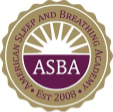Sleep apnea is a disorder that interrupts normal sleep patterns with intermittent pauses in breathing. Patients go into deep sleep for short periods and breathing is momentarily interrupted. They then must wake up and move to a shallow level of sleep in order to take a breath. The patient is usually unaware of this occurrence, however, their bed partners will often observe that the patient has stopped breathing, is holding his breath or gasping for air.
When this happens dozens or hundreds of times during the night, a person will wake up feeling tired and continue to feel drowsy throughout the day.
Types of Sleep Apnea
Obstructive Sleep Apnea, or OSA, occurs when the airway becomes blocked due to a collapse of the soft tissue in the back of the throat and tongue, or enlarged tissue in the tonsils and adenoids. When the patient's airway becomes blocked, they are not able to take a breath. Because the brain and heart are deprived of oxygen, blood pressure and heart rate increases can put the OSA patient at risk for heart attack and stroke. The breathing pauses can happen hundreds of time during the night, causing a snowball effect that leads to lack of energy and daytime sleepiness. Obstructive Sleep Apnea is the most common type.

Central Sleep Apnea, or Cheyne-Stokes Breathing, occurs when the brain and central nervous system malfunction and do not tell the body to try to breathe causing the apnea. Central apnea will usually be best treated by CPAP or BiPAP and only in specific circumstances will oral appliances be used. There is no blockage of the airway, only a lapse in the function of the respiratory center. Breathing can cease for as long as 2 minutes, starving the brain and heart of much needed oxygen. Central Sleep Apnea patients may also experience trouble exhaling after an episode of paused breathing.
Mixed Sleep Apnea. Mixed sleep apnea occurs when patients suffer from both Obstructive Sleep Apnea and Central Sleep Apnea. Patients experience breathing cessation due to a blocked airway and brain/muscle dysfunction.
Sufferers of obstructive, central and mixed sleep apnea can find the relief they need with professional sleep apnea treatment at Think Better Life. Contact our sleep dentists for your consultation by calling 1-847-533-8313 today.






